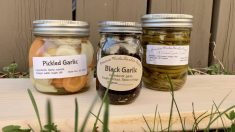Solid yields and near record prices.
Combine those two factors and the result is usually more acres.
Seeing how both of those conditions are in play, acreage of western Canadian soybeans should rebound in 2021.
The only question is the size of the rebound. Will acres increase by 30 percent or 60 percent?
“I keep checking my phone and I have to check it twice, because sometimes I think they made a mistake, but I’ve seen $15 soybeans already,” said Dennis Lange, provincial pulse specialist with Manitoba Agriculture.
Read Also

Farming Smarter receives financial boost from Alberta government for potato research
Farming Smarter near Lethbridge got a boost to its research equipment, thanks to the Alberta government’s increase in funding for research associations.
Since October, soybean futures in Chicago have risen from less than US$9.00 per bushel to more than $13.50 in early January. New crop soybean futures are about $2.00 lower — around $11.50 per bu.
Those prices, alone, should convince growers to seed more soybeans in 2021. But many Manitoba growers recorded yields in the 40s and 50s last fall, so that warm feeling should carry over into 2021.
“This year, our provincial average is expected to be around 38 bu. per acre,” Lange said.
That’s a huge jump from 2019, when the average was closer to 28 bu. per acre.
Soybean yields were terrible in 2019, thanks to a dry summer and a horrific fall. Parts of Manitoba received 150-200 millimetres rain from late August until early October — including 25-50 centimetres of snow before the Thanksgiving weekend.
Most producers harvested their soybean crop in November, reporting yields in the 20s or worse.
That was the final straw for some producers, who had suffered through three years of dry summers, below average yields and soft prices.
Soybean acres dropped off a cliff in Manitoba, mostly because of the anaemic yields. In 2017, the province had 2.3 million acres of beans and there was talk of acres climbing to three million.
In 2020, Manitoba had about 1.08 million acres, if pedigreed seed acres are included in the total.
Soybeans were still a common sight across Manitoba last summer but instead of committing 2,000 acres to beans, producers may have cut back to 1,000 acres in 2020.
Lange, who has witnessed the rise and fall of soybeans in Manitoba, said growers will plant more beans in 2021.
“My projection, based on conversations with growers and industry, is somewhere around that 1.4 million acres,” he said over the phone from Altona, Man.
That number could go higher but growers have multiple options right now. Canola futures are well above $600 per tonne, a level not seen since 2014. Plus, sunflowers and peas also look attractive.
The average field pea yield in Manitoba was around 55 bu. per acre in 2019 and likely higher in 2020, Lange said.
Some growers, particularly in the Swan River region, recorded yields of 70 and 80 bu. per acre.
“Field pea harvest operations are complete with yields averaging 50 to 90 bu. per acre… in the Swan River and Roblin areas,” said the Manitoba Agriculture crop report in October,
Rod Fisher of Fisher Seeds in Dauphin, said the robust yields are encouraging because field peas were a major crop in northwestern Manitoba.
“Peas and lentils were (big) around here from about 1975 to 1990,” he said. “Then we started getting wet summers, disease and the acres started to drop off.”
He grew peas in 2020 for the first time in about 10 to 15 years, with positive results.
“The new varieties are better — (with) better standability and better disease packages,” he said.
Last year, Manitoba farmers seeded about 147,000 acres of field peas.
That should jump in 2021 because of new demand within Manitoba. Roquette, a French company, is processing peas at its $400 million manufacturing plant in Portage la Prairie.
As well, Merit Foods has been constructing a plant protein processing facility in Winnipeg. The plant was scheduled to be operational in December.
“It’s kind of an exciting time… we’re seeing an increase in acres. But we’re not seeing it go crazy,” Lange said. “We’re seeing steps. Which is like to see.”
Lange is projecting 200,000 of field peas for 2021.
Contact robert.arnason@producer.com


















